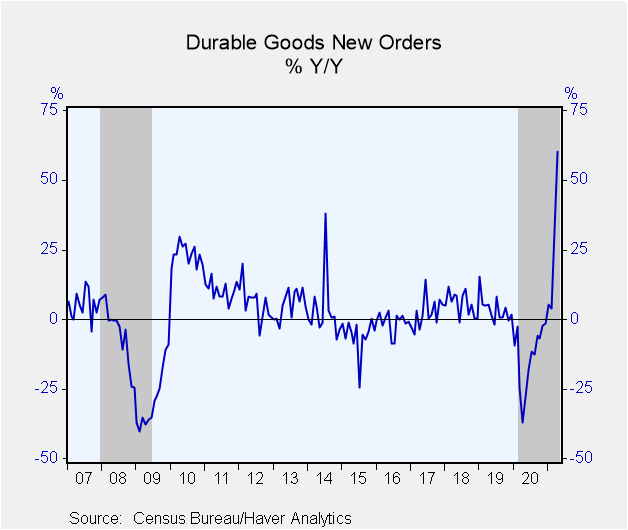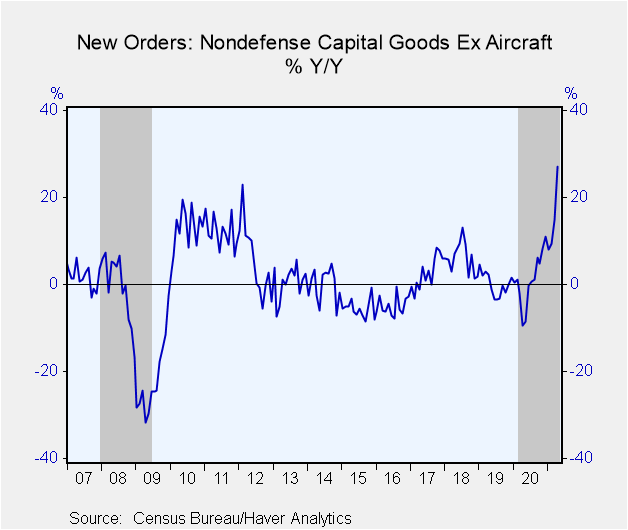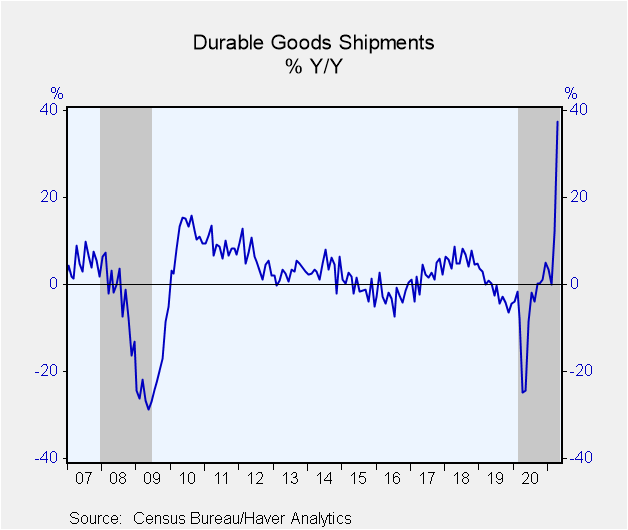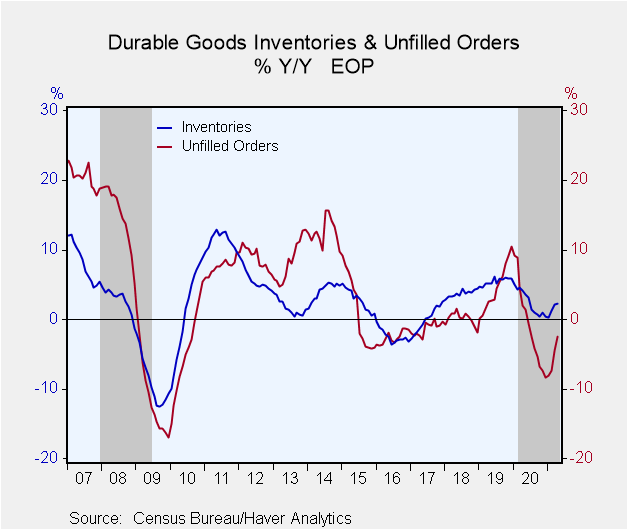 Global| May 27 2021
Global| May 27 2021U.S. Durable Goods Orders Fell in April
Summary
• Transportation orders drive the monthly decline in overall orders. • Core capital goods orders remain on a strong trajectory. • Shipments of durable goods and of core capital goods post healthy gains. Manufacturers' orders for [...]
• Transportation orders drive the monthly decline in overall orders.
• Core capital goods orders remain on a strong trajectory.
• Shipments of durable goods and of core capital goods post healthy gains.
Manufacturers' orders for durable goods declined 1.3% in April (+60.1% y/y) after rising 1.3% during March, revised from the previously reported 0.8% on May 4. This was the first monthly decline since April of 2020. A 0.8% rise had been expected in the Action Economics Forecast Survey.
Last month's decline was driven by a 6.7% (+335.2% y/y) fall in transportation equipment orders, notably a decline of 6.2% in vehicle and parts orders. Excluding transportation, orders were up 1.0% (+29.9% y/y), following a 3.2% (+17.2% y/y) rise in March.
Orders for nondefense capital goods orders excluding aircraft, "core capital goods" orders, rose a strong 2.3% (+27.1% y/y) in April, following a 1.6% (+14.8% y/y) rise in March.
In the major categories of the report, orders for primary metals rose 3.0% (+46.6% y/y), orders for fabricated metal products rose 0.9% (+46.9% y/y), orders for machinery rose 1.4% (+29.3% y/y), and for computers 0.4% (+9.5% y/y). Orders for electric equipment and appliances declined 0.9% over the month (+25.2% y/y).
Shipments of durable goods rose 0.6% in April (+37.4% y/y) following a 2.7% (+12.3% y/y) rise in March. Shipments of core capital goods rose 0.9% (+23.5% y/y). Shipments of transportation products dropped 0.4% over the month (+90% y/y), while shipments excluding transportation products rose 1.0% (+23.7% y/y).
Unfilled orders for durable goods rose 0.2% in April (-2.5% y/y), following a 0.5% rise in March (-4.4% y/y). Unfilled orders excluding transportation rose 1.6% (+10.1% y/y).
Inventories of durable goods rose 0.5% (+2.3% y/y) in April, following a 1.0% (+2.1% y/y) rise in March. Excluding transportation, inventories rose 0.4% (+1.1% y/y) and 0.8% (+0.8% y/y) in March.
The durable goods figures are available in Haver's USECON database. The Action Economics consensus forecast figure is in the AS1REPNA database.
| Durable Goods NAICS Classification | Apr | Mar | Feb | Apr Y/Y % | 2020 | 2019 | 2018 |
|---|---|---|---|---|---|---|---|
| New Orders (SA, % chg) | -1.3 | 1.3 | 1.3 | 60.1 | -13.6 | 3.5 | 5.2 |
| Transportation | -6.7 | -3.1 | 5.6 | 335.2 | -35.8 | 13.3 | 1.8 |
| Total Excluding Transportation | 1.0 | 3.2 | -0.5 | 29.9 | -1.0 | -1.4 | 7.0 |
| Nondefense Capital Goods Excl. Aircraft | 2.3 | 1.6 | -0.3 | 27.1 | 1.1 | -0.1 | 6.0 |
| Shipments | 0.6 | 2.7 | -3.1 | 37.4 | -6.0 | -1.5 | 5.8 |
| Nondefense Capital Goods Excl. Aircraft | 0.9 | 1.5 | -0.9 | 23.5 | -0.2 | 0.6 | 6.4 |
| Unfilled Orders | 0.2 | 0.5 | 0.8 | -2.5 | -8.4 | 10.4 | -1.9 |
| Inventories | 0.5 | 1.0 | 0.7 | 2.3 | 0.4 | 5.8 | 4.4 |
Kathleen Stephansen, CBE
AuthorMore in Author Profile »Kathleen Stephansen is a Senior Economist for Haver Analytics and an Independent Trustee for the EQAT/VIP/1290 Trust Funds, encompassing the US mutual funds sponsored by the Equitable Life Insurance Company. She is a former Chief Economist of Huawei Technologies USA, Senior Economic Advisor to the Boston Consulting Group, Chief Economist of the American International Group (AIG) and AIG Asset Management’s Senior Strategist and Global Head of Sovereign Research. Prior to joining AIG in 2010, Kathleen held various positions as Chief Economist or Head of Global Research at Aladdin Capital Holdings, Credit Suisse and Donaldson, Lufkin and Jenrette Securities Corporation.
Kathleen serves on the boards of the Global Interdependence Center (GIC), as Vice-Chair of the GIC College of Central Bankers, is the Treasurer for Economists for Peace and Security (EPS) and is a former board member of the National Association of Business Economics (NABE). She is a member of Chatham House and the Economic Club of New York. She holds an undergraduate degree in economics from the Universite Catholique de Louvain and graduate degrees in economics from the University of New Hampshire (MA) and the London School of Economics (PhD abd).
More Economy in Brief
 Global| Feb 05 2026
Global| Feb 05 2026Charts of the Week: Balanced Policy, Resilient Data and AI Narratives
by:Andrew Cates










